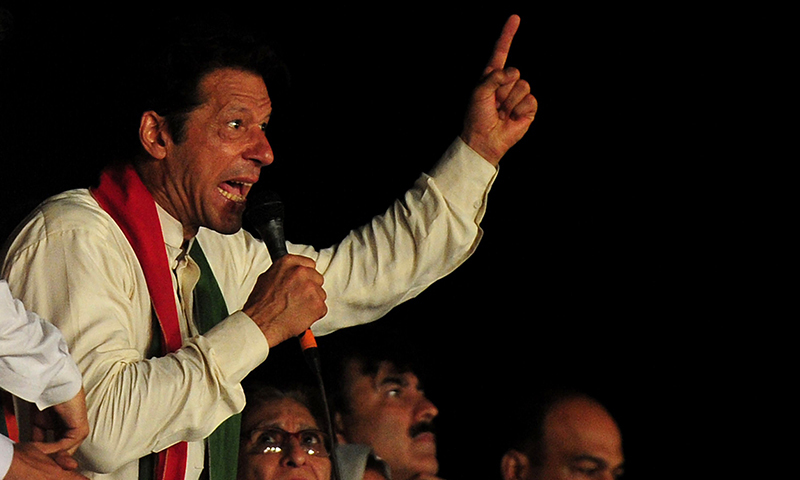Protesting for Pakistan: Why change can be dangerous

The hunt for a saviour never ceases in Pakistan.
The journey from Malik Ghulam Muhammad to Dr Tahirul Qadri is beset with coups, treachery, partition, regrets, hypocrisy, and lost lives. The shifting loyalties and whims of countrymen are elusive and as confounding to the ardent readers of history as to a perfunctory observer.
Having endured multiple coups and breaking of assemblies, one would expect of the people to be extremely sceptical of any more messianic orators.
But that's not the story.
They continue to be inexplicably excited about revolutionary rhetoric. Bizarrely, ours is a nation which distributes sweets at the beginning and end of every government.
More on the topic: More, not less
Multiple hypotheses may be drawn from these repetitions of adventures:
One, as Asghar Khan puts it, is that we never learn from our history.
Second, that people want change, and they do not care what avenue the desired change comes from.
And third, that Pakistanis are an impatient lot and get bored quickly — too quickly for their own good.
Our refusal to learn from history is evident from the way the same blunders are being committed again in the national and provincial arenas, as well as in the definition of foreign policy.
Despite the previous two Nawaz-led governments being dismissed because of hubris and unsolicited squabbles with institutions, the current government did little to dissociate itself from the past.
The ridiculous remarks passed about political opponents by some cabinet ministers, the army being dubbed ‘ghulail walay’ (carriers of hand catapults), and the lack of attention given to the just demands of opposition until they came to head are strong indicators of that.
Also read: PTI will not support unconstitutional measures, SC told
But does that mean resorting to extra-constitutional measures such as ‘Inqilab’ would provide the panacea we need?
In a choice between expedient and proper, we keep favouring the expedient, and we keep sticking to our choice despite our past suggesting against that choice.
That the luminaries in Pakistani politics are deaf to the dictates of history is only one aspect. The lessons are also lost on the awaam which, with watery eyes, falls for promises of change by demagogues every time.
Change in itself can be dangerous. It needs assiduous assessment and long-term planning, and no resort to revolutions as we so often yearn. David Gregory Roberts had remarked in Shantaram:
"Some of the worst wrongs were caused by the people who tried to change things."
Stalin and Hitler may spring to mind immediately, but Zia and the nationalisation of Pakistani industries in Bhutto’s era are not far removed from the above assertion. These gentlemen tried to avert the system a little too quickly, and see where we stand today.
Warning of the same dangers, Kenneth Minogue had described the consequences of revolutions in the most apt terms:
"No moth ever flew into the flames with more enthusiasm than the revolutionary. Revolutions have turned out to be what drug users called a bad trip."
Observing the way notable revolts after the American Revolution — including the French, Russian and the Iranian revolutions — spelled out, the obsession with such immediate resorts seems to be nothing more than mere infatuation.
If the intent is the well-being of people, then there is no sturdier bulwark of it than the democracy; allow it to flourish, let it dwell. Patience. Patience stout heart.
Unfortunately, our nation lacks this virtue. Galen Rowell, the American mountaineer, after his visit to Pakistan, had shrewdly described it as ‘a country in a hurry to go nowhere.’
Explore: Debating the dharna: No country for nuance
Such is our plight that we look for shortcuts in all matters of life. A fine example of this may be seen in the fast paced and discourteous traffic on roads. Cars speed up when the light turns ember and speed limits are crossed religiously. What good use those few seconds salvaged at considerable risk could be put to, is a riddle for anyone to answer.
The political classes of the country have ascertained this fatal flaw. It is thus no surprise that Tahirul Qadri and Imran Khan have held the country’s capital hostage after merely a year of the formation of government. They seek radical reforms whose implementations should necessarily have been more closely dwelt over.
If deadlines were meant to be adhered to, might one summon the audacity of reminding Imran of his promise of rooting out corruption from the system within 90 days of coming to power? Or is Khyber Pakhtunkhwa not a big enough stage?
Besides, why do people not question the impossibility of such deadlines?
A well-articulated notion states, ‘If it is too good to be true it usually is’.
Do not believe the quick fix solutions. The need, instead, is to re-evaluate our own mindsets and to allow the slow but sure process of evolution to run its due course.
Revolutions may sound like exhilarating prospects on the outset, but they are bloody affairs.
Badar Iqbal is a lawyer. He holds a law degree from BPP University, UK and an engineering degree in Electronic and Communications from Cardiff University. He writes intermittently for various national and international publications.
Find him on twitter @badarchaudhary













































